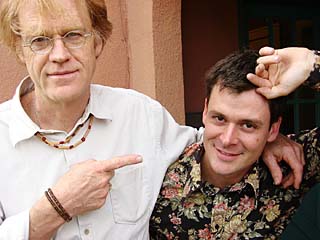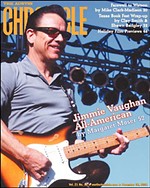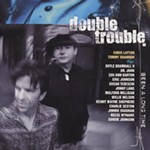Big in Yemen
Bob and Tucker Livingston Conquer the Middle East through songs, not arms
By Andy Langer, Fri., May 2, 2003

Bob Livingston knows all about tough crowds. Austin's veteran singer-songwriter has spent the better part of his adult life traveling off the beaten path with Michael Martin Murphy, Jerry Jeff Walker, and his own Lost Gonzo Band. And yet, there's very little that can prepare you for Yemen. Not Yemen, Texas -- the Republic of Yemen. As in the Middle East.
Three years ago, the U.S. State Department sent Livingston and his son Tucker to Yemen to entertain the country's mostly poor, mostly Muslim population, which isn't known for its love of the nightlife, let alone live music. Peaking from behind the theatre curtain, the Livingstons, dressed in cowboy hats, boots, and vests, found the audience separated by sex, the women with their faces covered and the men sitting uniformly with crossed arms.
Undeterred, Bob Livingston opened with the same spiel he'd used in similar trips to India, Nepal, Kuwait, and Bangladesh: "Hi. We're from America -- Texas. We're going to sing some cowboy songs about beautiful women and ugly men. Do any of you folks know how to yodel?"
Silence.
"In the beginning, they were completely cold," laughs Tucker Livingston, 28. "In the end, they weren't just yodeling. They were clapping and dancing in the aisles. It goes to show how music breaks down the barriers of geography and politics. And just as importantly, if you walk in with open arms and a smile, you'll get open arms and a smile right back."
Along with Yemen, the Livingstons' 2000 tour found them sharing smiles with audiences in India, Pakistan, and Syria, countries that a few minutes with CNN tell us we're now more likely to trade artillery fire than songs. And why was a father-son team from Austin touring some of the world's hottest hotspots? The answer dates back to 1996 in India, where Livingston and his family once lived.
While visiting his wife and two sons at an ashram, Bob Livingston met Fullbright Scholar Frank Black, an agent of the U.S. Information Service, a State Department branch charged with disseminating information about America and American interests abroad.
"He told me if you could convince the government that you're an expert in anything from hydroponics to country music, they'd put you on the road," recalls Livingston.
After an audition in Madras, Livingston and Lost Gonzo Band compatriot John Inmon were invited back to India to present "Cowboys & Indians," a program combining cowboy folklore, country songs, and audience interaction.
"We'd say, 'We're here to play country music. What country? That's the question,'" says Livingston, who embarked on USIS tours annually between 1986 and 1991, returning again in 1998 and 2000. "One guy in India introduced me by saying, 'Mr. Bob is here to play the country music of America and learn the country music of India.' They took 'country music' to mean 'your country's folk musicí' which was a wonderful interpretation."
Almost immediately, Livingston connected with audiences through prairie songs and prison blues, from John Denver's "Country Roads" to Woody Guthrie's "This Land Is Your Land" (modified for Indian audiences to "From the sunny Bombay to the plains of the Punjab to the Himalayan Mountains to the Arabian Sea"). By the time Tucker Livingston joined his father for the final pair of treks, one of the show's highlights had become a jam with their host country's native musicians on Buddy Holly's "Not Fade Away."
"We found that Bo Diddley/Buddy Holly beat is almost a primal instinct in every culture we visited," says the elder Livingston, who has spent the last 10 years putting on his Texas Commission on the Arts- and Austin Arts Commission-sponsored "Cowboys & Indians" show across the Lone Star State. "I'd figure out what key they were comfortable with and tune my guitar to them."
Although the show's early-Nineties incarnation briefly featured a vignette about George Bush and Saddam Hussein yodeling for world peace ("It's impossible to yodel and invade a country at the same time ..."), the Livingstons were typically careful to draw a sharp line between music and politics. Nevertheless, even as the family patriarch was touring the Middle East just before the original Gulf War, the Livingstons' trip to Yemen came at a time when American kidnappings were commonplace. Not that the pair ever felt they were in any danger or even experienced anti-American sentiment.
"I think even when the conversations turned political, they'd realize we don't represent our country's leaders or their actions," says Tucker Livingston, who spent much of his childhood with his mother in India while his father lived in Austin and toured with Walker and the Lost Gonzo Band. "And yet, having been there and talking to their people, it's even harder to understand what's going on today.
"The United States sets a certain amount of money aside from taxpayers to pay people like us to be goodwill ambassadors. Why do all that and go straight into a war without any diplomacy? I feel like all those years my father was doing that stuff may have been for naught. Maybe now more than ever we need to go back there and repair the damage."
Both Livingstons say their trips wound up informing not just their politics but also their music. Many of the songs Tucker Livingston used to earn his spot in the Austin Music Foundation's new Incubator program were written just after his return from the 2000 trip, while his live shows punctuate traditional singer-songwriter fare with splashes of tablas and a violinist playing Arabic scales.
An even more obvious East/West vision grounds Bob Livingston's latest CD, Mahatma Gandhi & Sitting Bull. Like the title suggests, it plays both spiritually and musically off the "Cowboys & Indians" premise, featuring musicians from Texas and India and songs inspired in equal parts by both. Even though father and son are busy supporting their individual pursuits, both say they'd jump at the chance to reunite for another USIS tour. Unfortunately, today's political climate has taken the bite out of funding and interest in the State Department's cultural programming.
"Back in the day, the big debate in the State Department was between what they called substantive programming -- largely lectures from professors -- and cultural programming like ours," explains Bob Livingston. "And I remember once in Bombay playing to 4,000 people and getting them all to yodel. Onstage I turned to our State Department guide and winked as if to say, 'I'd like to see the professor of geopolitics do this.'
"The power of music's ability to break the ice, to bring a crowd together and put smiles on their faces, is an amazing and powerful thing." ![]()








